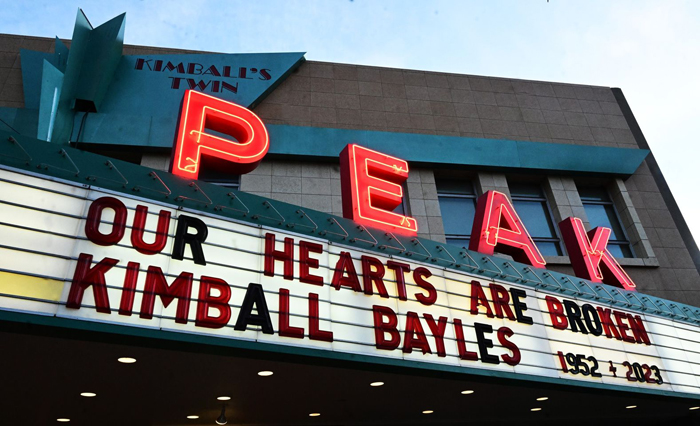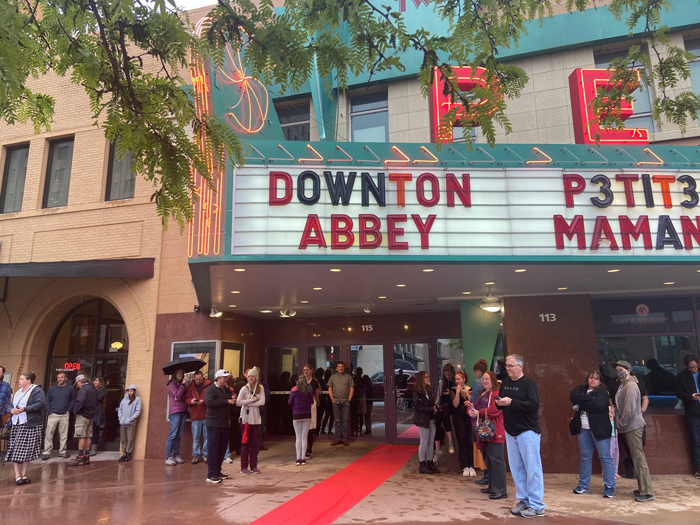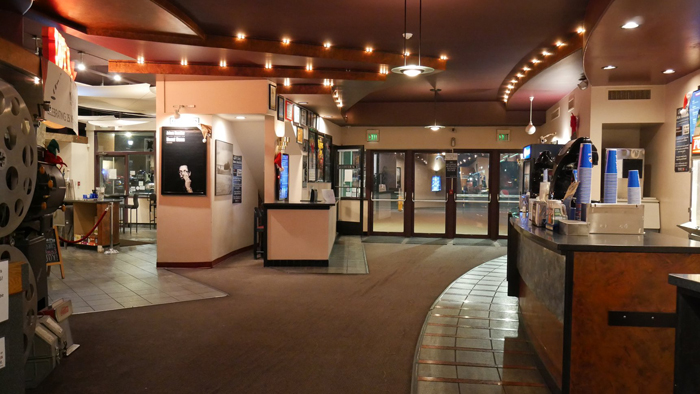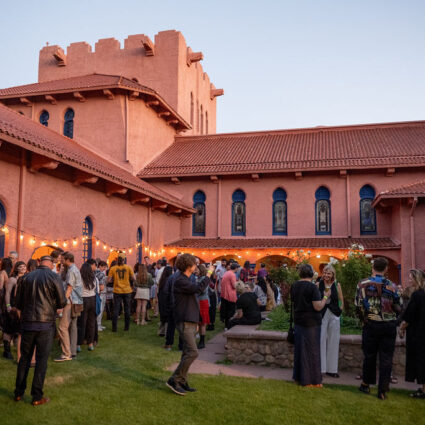Kimball’s Peak Three Theater has closed after the death of owner Kimball Bayles. Community leaders are coming together to try to save Colorado Springs’s only independent movie theater.

COLORADO SPRINGS—The only independent movie theater in Colorado Springs is closed indefinitely after the death of its owner, Kimball Bayles, on January 11, 2023. The community is now fighting to save a bastion for the arts in a growing and changing city.
Since 1994, Kimball’s Peak Three Theater was the only option for Colorado Springs residents to enjoy foreign and independent films carefully curated by Bayles, a former teacher originally from the Springs. The fate of the theater remains unclear, but a group of community leaders, small business owners, and film buffs are discussing options to preserve the independent cinema that they love.
“Because Kimball died, and there’s no succession plan for the business, it just cuts off,” says Warren Epstein, a Colorado Springs film critic who has played a key role in organizing a response to the Kimball’s closure. “There’s nobody who has any rights to it.”
After Bayles’s death, Epstein called together an ad hoc group that includes the Downtown Partnership of Colorado Springs, the Cultural Office of the Pikes Peak region, several local foundations, and film organizations such as Rocky Mountain Women’s Film and the Independent Film Society of Colorado.
“We wanted it to be a small enough number that we could actually get something done,” Epstein says. “Not only for Kimball’s legacy, but for all of us.”

The theater building is owned by the Murphys, who run a multi-generational family construction business in Colorado Springs. The Murphys bought the building in 2004 when Bayles was already a tenant, and hope that it will remain financially viable as a movie theater.
“We love the theater,” says Chuck Murphy Jr., who remembers being turned away from A Clockwork Orange at the original Peak theater when he was 16. “It has to be economically advantageous to us, but we are not looking to gouge. We are hoping to nurture, and see it be successful, and thereby be successful ourselves.”
Another advocate for Kimball’s is Richard Skorman, the owner of Poor Richard’s Downtown, a combo bookstore, toy store, restaurant-café, and the location of the original theater, which Bayles ran out of the Poor Richard’s bookstore before renting the iconic Kimball’s Peak Three Theater building.
“At the time, [Poor Richard’s Cinema] was the smallest independent theater in the United States,” Skorman remembers. “It only had fifty-five seats.”
Skorman recognizes that Bayles’s successors will have to innovate in order to survive.
“Unfortunately, independent movie theaters are a dying breed,” Skorman says. “The places that survive have become non-profit, membership theaters. And that’s the model that we are looking at.”

Epstein has been researching successful models for independent theaters, focusing on cities with similar populations to Colorado Springs, the state’s second-largest city after Denver, with a population of nearly 500,000.
One example he has found is Circle Cinema Theater, a ninety-five-year-old nonprofit arthouse theater in Tulsa, Oklahoma. Circle Cinema presents independent, foreign, and documentary films, as well as classics and even silent films with musical accompaniment. Epstein appreciates the Circle’s innovative techniques that turn every movie showing into an event.
“They’ll show The Banshees of Inisherin and have donkeys in the lobby,” Epstein laughs. “The all-of-the-above programming is the only way to survive in independent film right now.”
Kimball’s Peak Three is located in the heart of Colorado Springs’s historic downtown, on Pikes Peak Avenue, which presents both a unique challenge and a call to action. The city’s population grew 15 percent in the last decade, according to U.S. Census data. Real estate values have skyrocketed as well, with average home prices nearly doubling in the last five years. Skorman, who previously served as both vice mayor and city councilman, says that downtown is “going through a renaissance.”
“It’s becoming a big, pedestrian-friendly residential and commercial district,” Skorman notes. “An active theater… really does help downtown. It becomes a meeting place… but you’re not going to have those big audiences unless you figure out how to combine it with other purposes.”
Ralph Giordano, festival director of the nonprofit Independent Film Society of Colorado, agrees that Kimball’s is a unique and important place for the city. Fifteen years ago, Kimball’s Peak Three hosted the IFSOC’s first-ever Indie Spirit Film Festival.
“In Colorado Springs, there really isn’t anything else like it,” says Giordano. “It is part of our independent film history.”
The Indie Spirit Film Festival is only one of Colorado Springs’s independent film festivals; the city is also home to Rocky Mountain Women’s Film Festival, which is the longest-running women’s film festival in North America.
“Clearly, [Kimball’s Peak Three] was our one and only shining star that featured independent film,” says Linda Broker, executive director and head of programming for Rocky Mountain Women’s Film. “As an organization that shows independent film, I feel that it is another gateway for people… it piques their interest in what we’re doing, and I hope the reverse is true as well.”
For now, it remains unclear what will happen to Kimball’s Peak Three Theater. But Kimball Bayles and his passion for independent films had an undeniable impact. At a memorial service held for Bayles on January 29, several hundred people gathered in the historic City Auditorium to remember the man who tirelessly promoted film and the community in Colorado Springs.
Bayles is survived by his wife, Sabrina, and their daughter. Sabrina Bayles says the response to Kimball’s death has shown how much the theater meant to the Colorado Springs community.
“So many people have sent notes about the theater and what it meant to them,” Bayles says. “I know that he would be humbled by the effort [to save the theater].”
At the memorial service, speakers shared how Kimball—and the films he showed at the Peak Three—became part of the city’s fabric. One of the featured speakers was Daniel Junge, an Oscar-winning Los Angeles filmmaker who worked as the first-ever projectionist for the theater, back when it was housed in Poor Richard’s Bookstore.
“It turns out friends are almost like art cinemas,” Junge warned during the January 29 memorial service. “You don’t fully appreciate them until they’re gone.”



